Empowering through education to prevent the spread of invasive species.
The spread of invasive species has been identified as a leading threat to ecosystems and natural resources. It’s been estimated to cost Tennesseans over $2.4 million dollars to manage invasive plant species in our natural areas. Tennessee 4-H has partnered with the Tennessee Invasive Plant Council and the Tennessee Department of Agriculture to present this educational program and contest for 4th-8th grade students in public, private, and homeschools. All Tennessee students are eligible to participate.
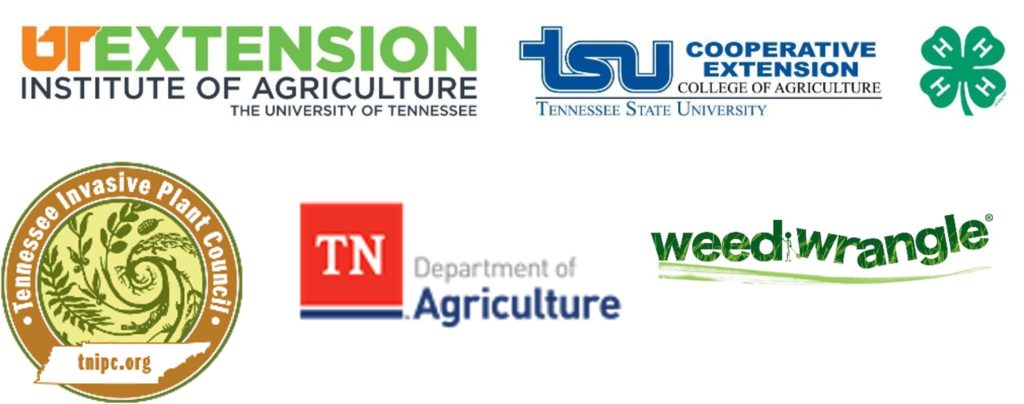
Contest Information
Tennessee youth are invited to participate in the 2nd Annual Tennessee Invasive Species Youth Poster Contest. The goal of this contest is to spread awareness and knowledge among youth and adult audiences through science-based information and individual creativity to educate others on the impacts of invasive species in Tennessee and beyond. The final product is a “most wanted” poster for a species of the student’s choosing from the list below of established invasive plant species in Tennessee.
Eligibility
All students in public, private, or home school in Tennessee are eligible to participate. All entries must be submitted electronically. Review the entry form for more details and return when ready to submit an entry. Each entry requires an upload of a high-resolution image (>1 MB) of the poster. This could be a photograph, scanned document, or original digital creation. Files accepted include .jpg, .png, or .pdf.
Poster Divisions
There are two contest divisions:
- 4th and 5th grade division
- 6th, 7th, and 8th grade division.
Deadline
All entries must be submitted by July 1, 2023.
Judging
A panel of judges from the public sector with expertise in the sciences, education, and the arts will judge each entry. Judging will take place in June-July and winners will be announced by Aug 1, 2023
Judging criteria include:
- Message is effective 40%
- Demonstrates understanding of topic 20%
- Universal appeal 20%
- Follows contest rules 10%
- Originality and creativity 10%
Prizes
Awards for 1st, 2nd, and 3rd place will be made for each division (4th-5th Grades and 6th-7th-8th Grades). Honorable Mentions will be identified as judges see fit.
- Gift card awards for student winners in each division are provided by Weed Wrangle and the Tennessee Department of Agriculture and include:
- 1st Place – $75
- 2nd Place – $50
- 3rd Place – $25
- The class with the overall winner will receive an UpRooter Mini provided by Weed Wrangle®.
- The overall winner will be included on the Tennessee Department of Agriculture Invasive Species Poster distributed statewide.
Winners in each division will be showcased at the Science, Technology, Engineering and Mathematics (STEM) display at the Tennessee State Fair in August 2023. To be included in the display, original hard copy posters must be delivered to the local County Extension Office. Original posters will be returned to students at a later date.
Rules
- All artwork must be the original work of the individual student.
- Poster dimensions must be 11 by 17 inches or smaller. Construction paper is permitted but all poster components must be trimmed and fit inside the dimensions of 11 by 17 inches.
- Posters can be on any color paper.
- Photos cannot be used on posters. No imported images allowed (e.g. clipart, icons).
- Any media or coloring materials may be used (i.e. crayons, watercolors, chalks, markers, etc.)
- Stamps or stickers cannot be used.
- Creativity and “thinking outside the box” will be rewarded.
- No personal identification information (i.e. names) should be included on the poster.
- Poster artists must release all rights and provide permission for their work to be displayed in public platforms related to this competition.
Contact Andrea Ludwig at aludwig@utk.edu with general questions. For Tennessee 4-H STEM questions, contact Daniel Collins at dcolli38@utk.edu.
Helpful Tips
- Be aware of copyrights, which are protected by law. If you see this symbol – © – then it can not be used on your poster.
- Choose a brief, catchy message for your poster. Keep it simple.
- Use colors and visual interest to capture attention.
- Do not use photos, stamps, stickers, copyrighted materials, personal names.
Additional Opportunities
We encourage youth to display their posters in their communities to help spread awareness. Some ideas for where to seek permission to display posters are:
- School entryways, hallways, cafeterias, or classrooms
- Local libraries, city hall, and other municipal buildings
- County Extension office
- Local or state park welcome centers
Celebrating 2022 Award Winners!
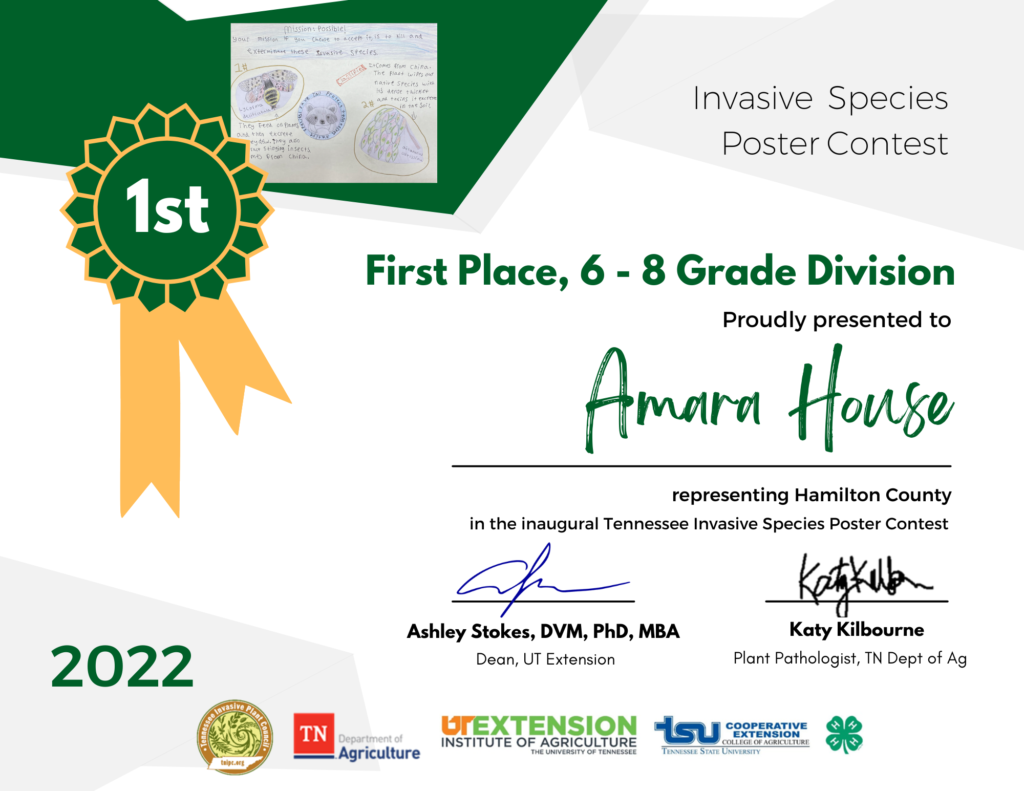
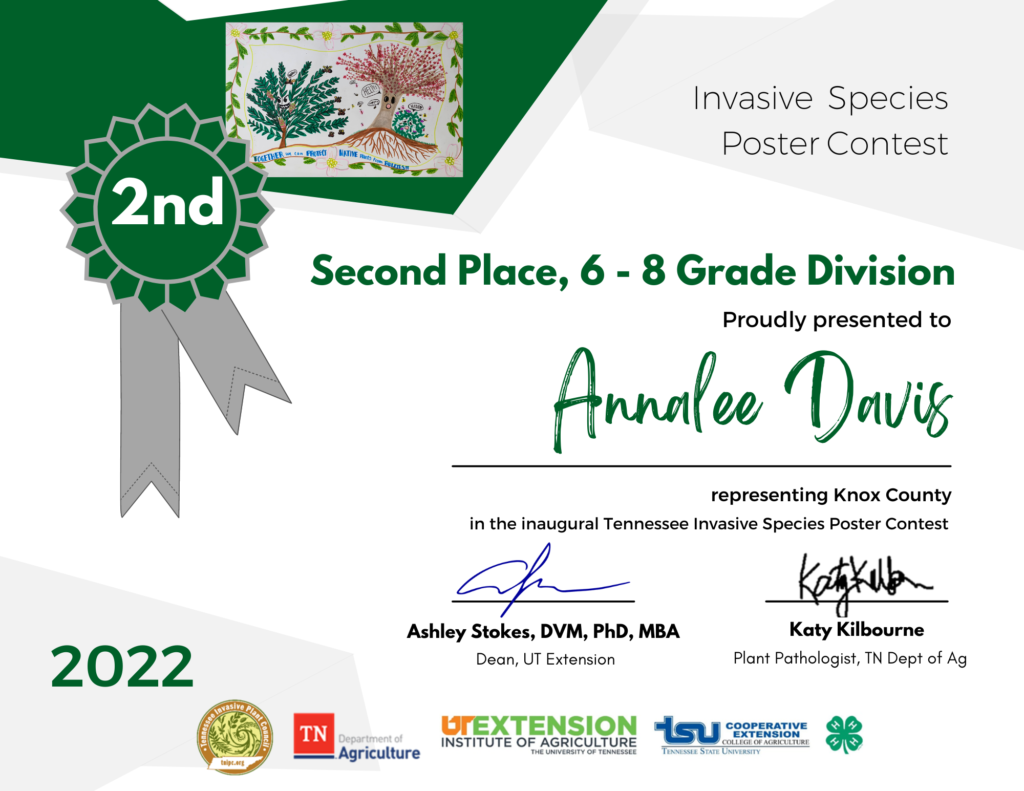
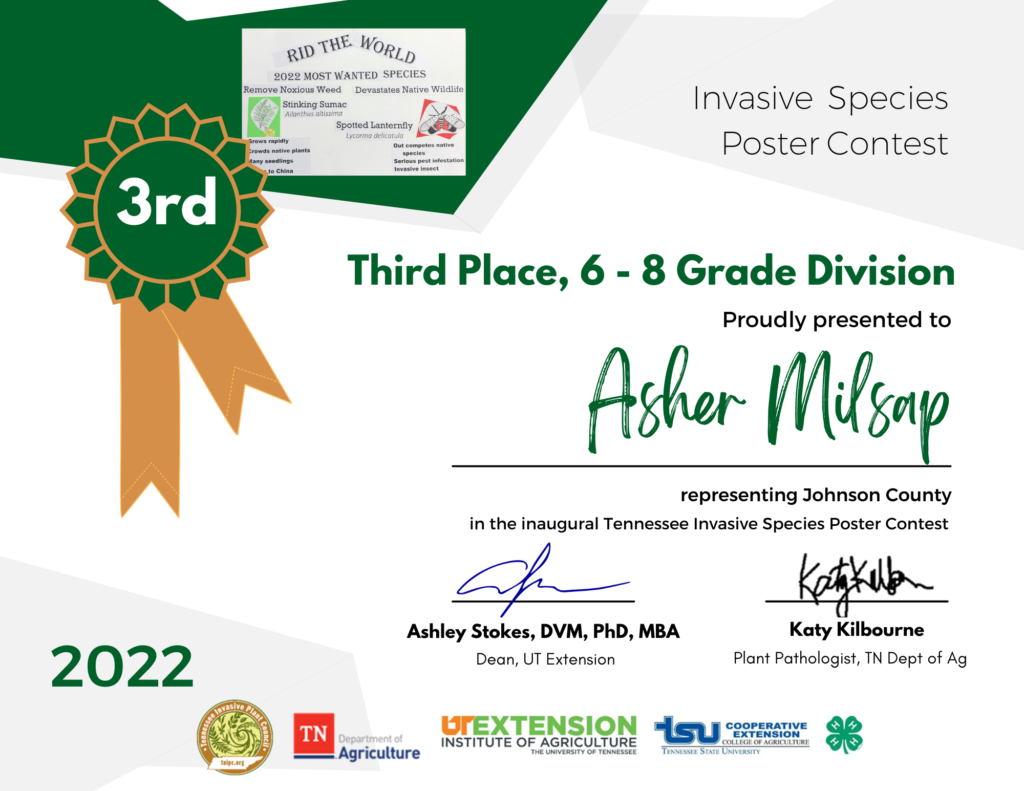
Additional Resources
Learn about the impact of invasive species in Tennessee and around the country with the resources below. Start with these and find additional references through research. Use science-based, verified information to direct poster content and creativity to hook audiences and transfer knowledge about the importance of eradicating and managing invasive species.
- Tennessee Department of Agriculture: https://www.tn.gov/agriculture/businesses/plants/plant-pests-and-quarantines/insects.html
- Tennessee Invasive Plant Council – www.tnipc.org
- National Geographic: https://www.nationalgeographic.org/activity/introduction-invasive-species/
- Kids Britannica: https://kids.britannica.com/students/article/invasive-species/631812
- National Wildlife Federation: https://www.nwf.org/Educational-Resources/Wildlife-Guide/Threats-to-Wildlife/Invasive-Species
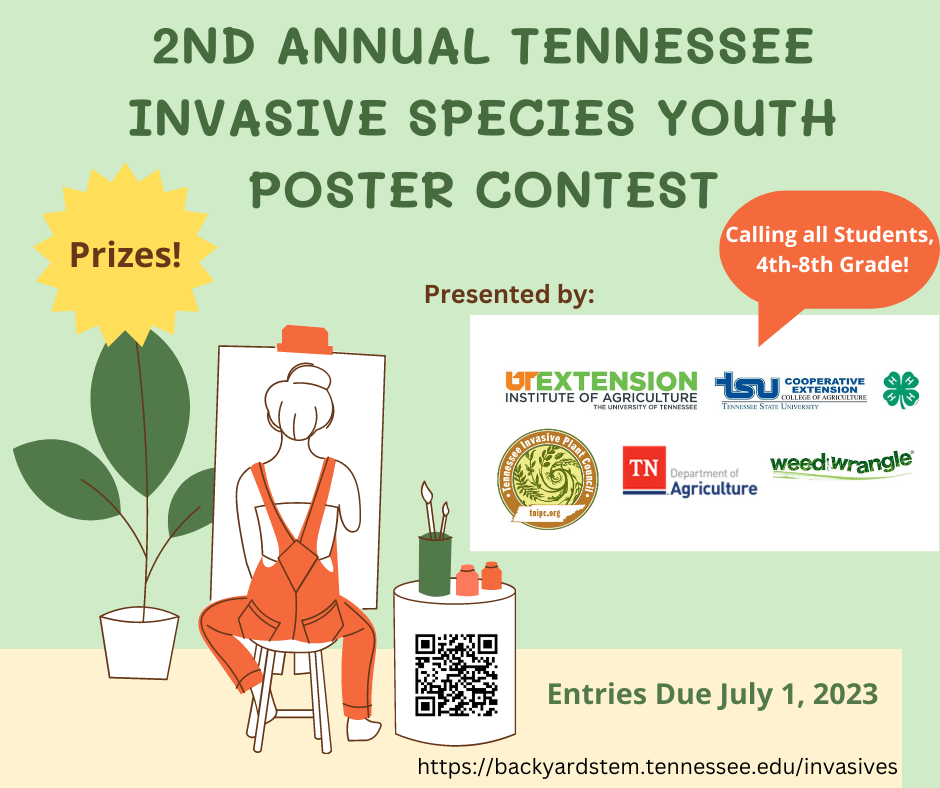
Committee Members
Daniel Collins, Extension Specialist, 4-H Youth Development, University of Tennessee
Jimmy Groton, Tennessee Invasive Plant Council
Katy Kilbourne, Plant Pathologist, Tennessee Department of Agriculture
Andrea Ludwig, Associate Professor & Extension Specialist, Biosystems Engineering and Soil Science Department, University of Tennessee
Cayce McAlister, Weed Wrangle
Anni Self, Plant Certification Administrator, Tennessee Department of Agriculture